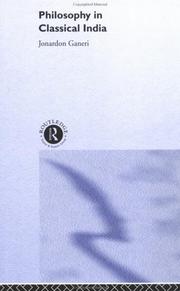| Listing 1 - 4 of 4 |
Sort by
|

ISBN: 0415240344 0415240352 9780415240345 9780415240352 020315827X 0203171195 1134551630 1134551649 1280401591 Year: 2001 Publisher: London : Routledge,
Abstract | Keywords | Export | Availability | Bookmark
 Loading...
Loading...Choose an application
- Reference Manager
- EndNote
- RefWorks (Direct export to RefWorks)
This original work focuses on the rational principles of Indian philosophical theory, rather than the mysticism more usually associated with it. Ganeri explores the philosophical projects of a number of major Indian philosophers and looks into the methods of rational inquiry deployed within these projects. In so doing, he illuminates a network of mutual reference, criticism, influence and response, in which reason is used to call itself into question. This fresh perspective on classical Indian thought unravels new philosophical paradigms, and points towards new applications for the concept of reason.
Philosophy, Indic --- Philosophie de l'Inde --- Philosophy, Indic. --- Indic philosophy --- Philosophy, East Indian --- Hindu philosophy
Book
ISBN: 9780199314621 9780199314621 0199314624 9780197503812 9780190885007 9780190253127 Year: 2017 Publisher: New York (N.Y.) : Oxford university press,
Abstract | Keywords | Export | Availability | Bookmark
 Loading...
Loading...Choose an application
- Reference Manager
- EndNote
- RefWorks (Direct export to RefWorks)
The Oxford Handbook of Indian Philosophy tells the story of philosophy in India through a series of exceptional individual acts of philosophical virtuosity. It brings together forty leading international scholars to record the diverse figures, movements, and approaches that constitute philosophy in the geographical region of the Indian subcontinent, a region sometimes nowadays designated South Asia. The chapters provide a synopsis of the liveliest areas of contemporary research and set new agendas for nascent directions of exploration. Each of the chapters provides compelling evidence that in the global exercise of human intellectual skills India, throughout its history, has been a hugely sophisticated and important presence, host to an astonishing range of exceptionally creative minds engaged in an extraordinary diversity of the most astute philosophical exploration conceivable. It spans philosophy of law, logic, politics, environment, and society, but is most strongly associated with wide-ranging discussions in the philosophy of mind and language, epistemology and metaphysics (how we know and what is there to be known), ethics, meta-ethics, and aesthetics, and meta-philosophy. The reach of Indian ideas has been vast, both historically and geographically, and it has been and continues to be a major influence in world philosophy. In the breadth as well as the depth of its philosophical investigation, in the sheer bulk of surviving texts and in the diffusion of its ideas, the philosophical heritage of India easily stands comparison with that of China, Greece, the Latin West, or the Islamic world.
Indian philosophy. --- Indians --- Philosophy, Indian --- Philosophy --- E-books --- Indian philosophy --- India --- Philosophy, Indic.
Book
ISSN: 13582461 ISBN: 9780521165150 0521165156 Year: 2010 Volume: 66 Publisher: Cambridge [etc.] Cambridge University Press
Abstract | Keywords | Export | Availability | Bookmark
 Loading...
Loading...Choose an application
- Reference Manager
- EndNote
- RefWorks (Direct export to RefWorks)
Philosophy --- Interpretation (Philosophy) --- Therapeutic use --- Philosophical anthropology --- Depth psychology --- Mental philosophy --- Humanities --- Philosophy - Therapeutic use
Book
ISBN: 9781409443544 140944354X 9781138261792 9781315586809 9781317121916 9781317121923 1409456625 1315586800 1317121929 9786613654540 1409443558 1280677619 1138261793 9781409443551 Year: 2012 Publisher: Surrey, England : Ashgate,
Abstract | Keywords | Export | Availability | Bookmark
 Loading...
Loading...Choose an application
- Reference Manager
- EndNote
- RefWorks (Direct export to RefWorks)
The debates between various Buddhist and Hindu philosophical systems about the existence, definition and nature of self, occupy a central place in the history of Indian philosophy and religion. These debates concern various issues: what 'self' means, whether the self can be said to exist at all, arguments that can substantiate any position on this question, how the ordinary reality of individual persons can be explained, and the consequences of each position. At a time when comparable issues are at the forefront of contemporary Western philosophy, in both analytic and continental traditions (as well as in their interaction), these classical and medieval Indian debates widen and globalise such discussions. This book brings to a wider audience the sophisticated range of positions held by various systems of thought in classical India.
Hindu philosophy. --- Buddhist philosophy. --- Ātman. --- Anātman. --- Hinduism --- Buddhism --- Relations --- Buddhism. --- Hinduism. --- Hindu philosophy --- Buddhist philosophy --- Ātman --- Anātman --- Hinduism - Relations - Buddhism --- Buddhism - Relations - Hinduism
| Listing 1 - 4 of 4 |
Sort by
|

 Search
Search Feedback
Feedback About
About Help
Help News
News